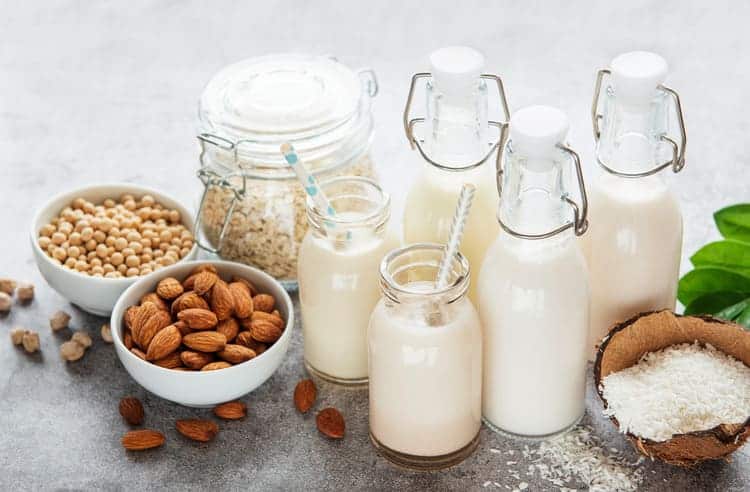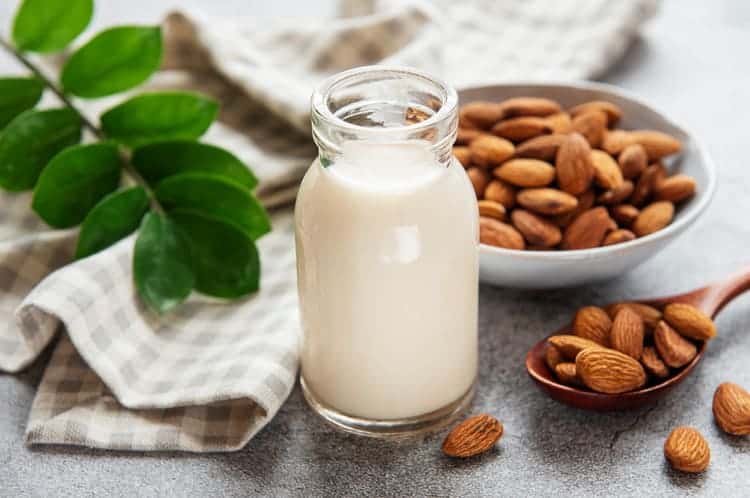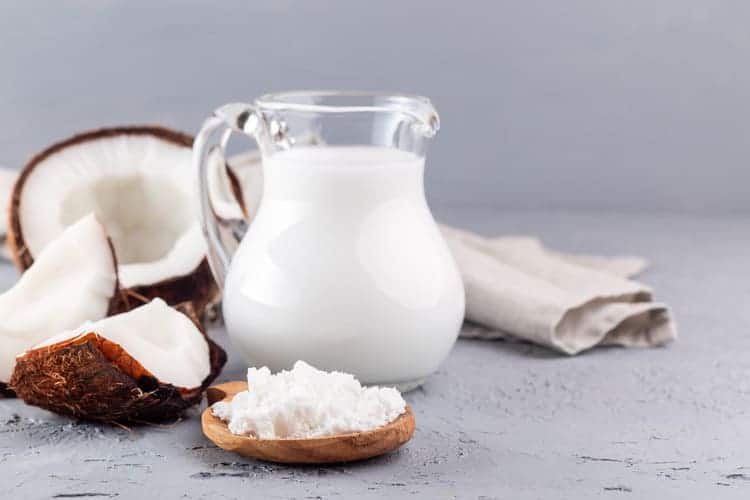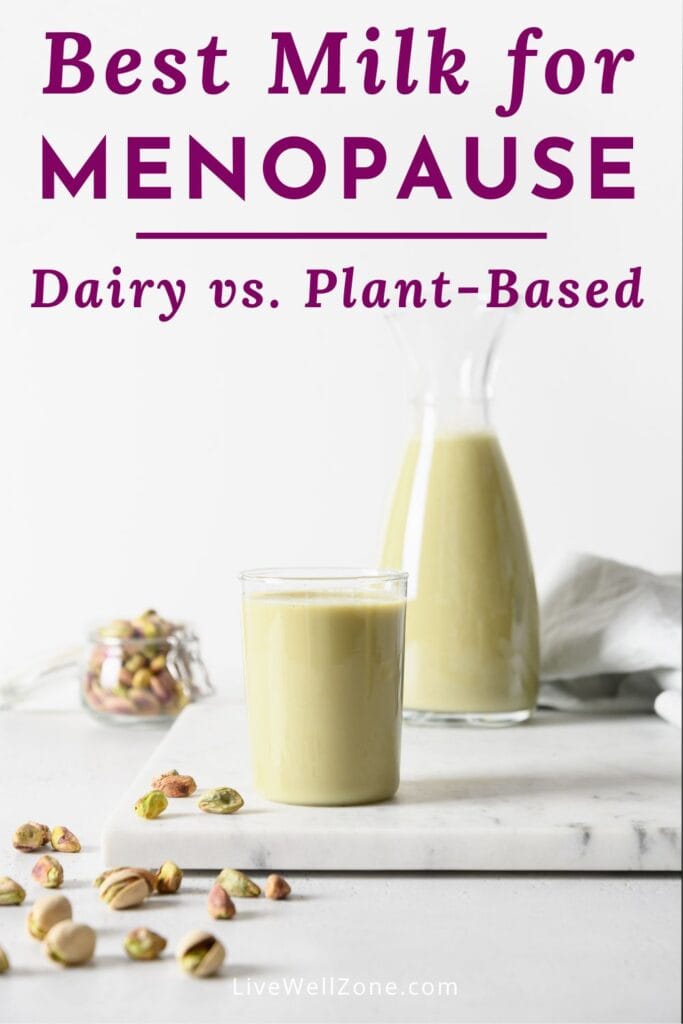
With a plethora of available options, choosing the best milk to support your body during menopause can be more than a little confusing.
It doesn’t help that everyone has a different opinion about the benefits – and safety – of cow’s milk vs plant-based milk.
But the truth is the only person who can decide what works for you is you!
So, the goal of this article is to help you make an informed decision about the best milk for menopause by highlighting:
- The pros and cons of cow’s milk and plant-based milk.
- Various types of plant-based milks to consider adding to your diet.
Let’s dive right in!
IS DAIRY MILK GOOD FOR MENOPAUSE?
Cow’s milk is a source of nutrients like calcium, phosphorus and vitamin D, which are all crucial for bone health and preventing osteoporosis (a growing concern in menopause). However, there’s concern about the safety of antibiotics and growth hormones that are given to cows.
For example, a 2019 review published in the Journal of Advanced Veterinary and Animal Research states that “significant portions of antibiotics are released through milk of dairy animals unaltered and exert serious harmful effects on human health” (source).
The paper adds that exposure to antibiotic residue could affect gut health, lead to antibiotic resistance, contribute to allergies and more.
Now, when it comes to hormones in cow’s milk, it’s important to note that there are two types:
- The natural hormones produced by the cow.
- Synthetic hormones given to cows.
The second category is what is concerning for many consumers. Of particular concern is rBGH aka rBST.
For example, research shows that milk from cows treated with rBGH contains higher levels of the hormone IGF-1.
While some studies suggested a correlation between IGF-1 and certain cancers, other studies have either shown no correlation or a weak correlation (source).
So, while the research has been inconclusive, some people – myself included – choose to be cautious and avoid cow’s milk altogether.
In other cases, people choose to go for organic milk (and organic dairy as a whole) because those food items come from cows that have not been treated with rBGH or antibiotics.
IS PLANT-BASED MILK GOOD FOR MENOPAUSE?
Plant-based milks, such as almond, soy, oat, and coconut milk, have become increasingly popular as an alternative to dairy milk.
This is mainly because there is no need to worry about being exposed to antibiotics and synthetic hormones.
However, it’s important to note that plant-based milks can contain:
- Added sweeteners.
- Synthetic flavors.
- Additives.
- Preservatives
- Thickeners.
So if you want to avoid these added ingredients you can either make your own plant milk at home or look for a brand that makes plant milks that are free of all the extras.
TOP MILK OPTIONS FOR YOUR MENOPAUSE DIET
As with all things related to food, there is no one perfect milk for every single woman.
So, while the list below contains suggestions of milks you can add to your diet, remember that these are just suggestions.
It’s still important that you listen to your body and make the choice(s) that best supports your body.
1. Almond Milk

As a plant-based alternative to cow’s milk, almond milk is a good source of vitamin E, which may help ease hot flashes (source).
In addition, depending on the brand you purchase, almond milk can also be fortified with calcium and vitamin D, both important nutrients for bone health.
Lastly, almond milk contains healthy fats which the body needs to make sex hormones and adrenal hormones.
2. Oat Milk
One of the main benefits of drinking oat milk is that it contains some fiber – about 2-3 grams per serving (source).
While this is far less than the amount of fiber you’d get from eating oats, it’s still better than, say cow’s milk (which has no fiber) and unsweetened almond milk (which has about 0.8g) (1, 2).
Since oats are rich in carbohydrates, this milk tends to have a naturally sweeter flavor, which can work well in a smoothie or a golden milk recipe.
Like many plant-based milks, some oat milks are fortified with calcium and vitamin D.
3. Coconut Milk

Of all the plant milks out there, coconut milk has the highest amount of natural fats.
Of these fats, one particular type – MCTs or medium-chain triglycerides (MCTs) – may help with gut and heart health.
In addition, MCTs are easily digested and quickly converted into energy. As a result, they may help to naturally boost energy levels..
4. Cashew Milk
Like many plant-based milks, cashew milk contains proteins and healthy fats, making it a good addition to any menopause diet plan.
In addition, cashew milk provides some magnesium (supports sleep and balanced mood) and iron (essential for thyroid function and energy).
4. Soy Milk
Aside from being rich in phytoestrogens known as isoflavones, soy milk has the highest amount of proteins (when comparing plant milks).
While there is research showing that isoflavones help to ease hot flashes, there is debate over the safety of soy milk.
While I am not anti-soy, I do avoid soy milk simply because it is an unfermented soy product.
In the parts of the world where soy has traditionally been consumed, they consumed mostly fermented soy products.
In addition, research shows that the health benefits of soy mainly come from a compound called equol. Equol is produced in the gut as part of the digestion of soy.
But in order to make equol, your gut must be healthy and must have the bacteria necessary to produce it.
Interestingly, studies show that only a small number of the U.S. population has the gut bacteria necessary to produce equol (whereas in countries, like Japan up to 70% of the population can make equol).
And to add to the intrigue, fermented soy contains high amounts of equol (which goes back to the fact that fermented soy is what many countries have traditionally consumed).
So, given all the variables around soy milk, I generally avoid it.
But that said, this is your body and it’s ultimately up to you to decide how you feed and nurture your body.
5. Hemp Milk
Made from protein-rich hemp seeds, hemp milk contains all 9 essential amino acids (though the amounts of some specific amino acids are not as high as animal sources).
In addition, while hemp milk does provide protein, the amount is still not as high as soy milk or oat milk (both of which have more).
Furthermore, hemp milk contains omega-3 and omega-6 fatty acids, both of which are anti-inflammatory and beneficial for heart health.
6. Pea Milk
Of all the plant-based milks, research shows that pea milk has one of the strongest nutritional profiles.
In particular, pea milk contains about 50% more magnesium, phosphorus, zinc and selenium when compared to cow’s milk (source).
Similar to hemp and soy, peas also contain all nine essential amino acids.
While the milk alone should not be relied upon as your main source of proteins, it’s good to know that it contributes something.
CONCLUSION
Selecting the best milk for menopause ultimately depends on individual preferences, dietary needs and health considerations.
If you are lactose-intolerant, then plant-based milks are your best bet. These milks cater to a wide range of tastes and dietary restrictions.
However, if you find that cow’s milk doesn’t contribute to allergies or signs of inflammation, then go with that.
Just listen to your body and make your choice accordingly.

You Might Also Like:
Hormone Balancing Diet Plan: Anti-Inflammatory Foods, Vitamins and Meal Planning Tips for Women
Cool Off Naturally: 12 Powerful Herbs for Menopause Hot Flashes
Menopause Smoothie: Best Ingredients To Use For Relief & Recipes
Perimenopause Diet: A Definitive Guide for Better Sleep, Hot Flashes, Healthy Weight & More
How to Go Through Menopause Naturally: 7 Steps To Start Using Today


